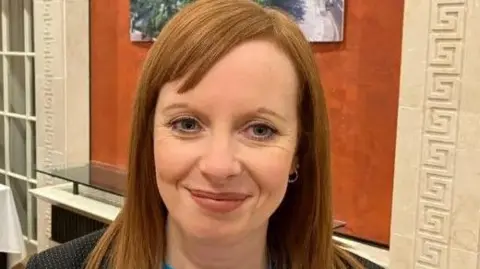Staff shortages for SEN school leavers 'off the scale'
 Karen Ryan
Karen RyanA shortage of staff to support young people with SEN (Special Educational Needs) who are about to leave school is "off the scale," the chair of Stormont's Education Committee has said.
Nick Mathison was among MLAs who heard on Wednesday that there is only one staff member in the Education Authority (EA) for every 880 such young people.
Karen Ryan's 16-year-old daughter, Emily, was born with a rare chromosome disorder and has profound needs.
She is one of many parents concerned about what is in place for Emily when she leaves school after the age of 19.
Emily is non-verbal, tube-fed and is a wheelchair user.
Karen said that Emily currently gets "specialist care on site" at Parkview Special School in Lisburn, where she is a pupil.
"I've been raising my concerns about the fact that the unit she's most likely to go is already full to capacity," Karen told BBC News NI.
"So in three years' time what is the likelihood of her being able to go to that one and only specialist unit in my local area that can cater for her needs?
"If she was to get a place I doubt it would be a full-time place."
What happens when SEN pupils turn 19?
Karen said she was concerned about the "transitioning process" for Emily leaving school.
Parents and special school principals have previously said young people with SEN face a "cliff edge" at the age of 19.
That is because there is no statutory pathway for them to go into further education or training.
In England, an Education, Health and Care plan (EHCP) outlines a young person's special educational needs up to the age of 25 but in Northern Ireland, no such plan is in place.
"We know of these children from birth, from when they enter school to when they leave school," said Karen.
"Yet, at the moment, they seem startled when they suddenly turn 19 and are about to leave school.
"Better contingency between the local health trust and education would make a big difference."
"These children are very unique, they don't stop learning," she added.
"They progress at a much slower rate, but they don't stop learning at 18, 19 years of age.
"Without the input from the statutory services, they can regress."
Karen told BBC News NI that she supports a campaign by a fellow parent, Alma White, for an education plan to be in place for young people with SEN when they leave school until the age of 25.

What support exists for SEN pupils leaving school?
Assembly members on Stormont's Education Committee questioned staff from the EA on the support for young people with SEN on Wednesday.
The EA has a transition planning process for children with a statement of SEN from the age of 14.
But the number of young people with SEN in that process has tripled in less than two decades.
There are currently around 9,000 young people with SEN between the ages of 14-19 who require help to transition.
But Clar McKenna from the EA said there were only 10 "transition coordinators" within the EA's transition service.
"Nine hundred for a case load feels absolutely off the scale in terms of what can be delivered," Nick Mathison said.
"It is impossible," Ms McKenna replied.
"They can't get to every meeting."
Each child with a statement of SEN should have a "transition plan" in place from the age of 14, but MLAs questioned who was responsible for delivering that plan.
What are Northern Ireland's politicians saying about SEN concerns?
"Nobody has statutory responsibility to ensure that it is delivered," Mathison said.
"Nobody has to act on that plan."
Sinn Féin MLA Danny Baker said "more and more is falling on the schools".
Alliance MLA Michelle Guy said that "if anybody's lucky enough to get a plan, nobody's responsible for that plan".
She added: "Is anybody monitoring whether placements are appropriate or successful when somebody manages to get one?"
Ms McKenna said that "once that child leaves school the remit leaves education".
"Appropriate pathways for young people in training, education and day care - that we know is limited," she told MLAs.
"Every geographical area is different in what is available to our young people.
"It's incredibly difficult, I'll be brutally honest, it's incredibly difficult.
"The pathways are not there."
